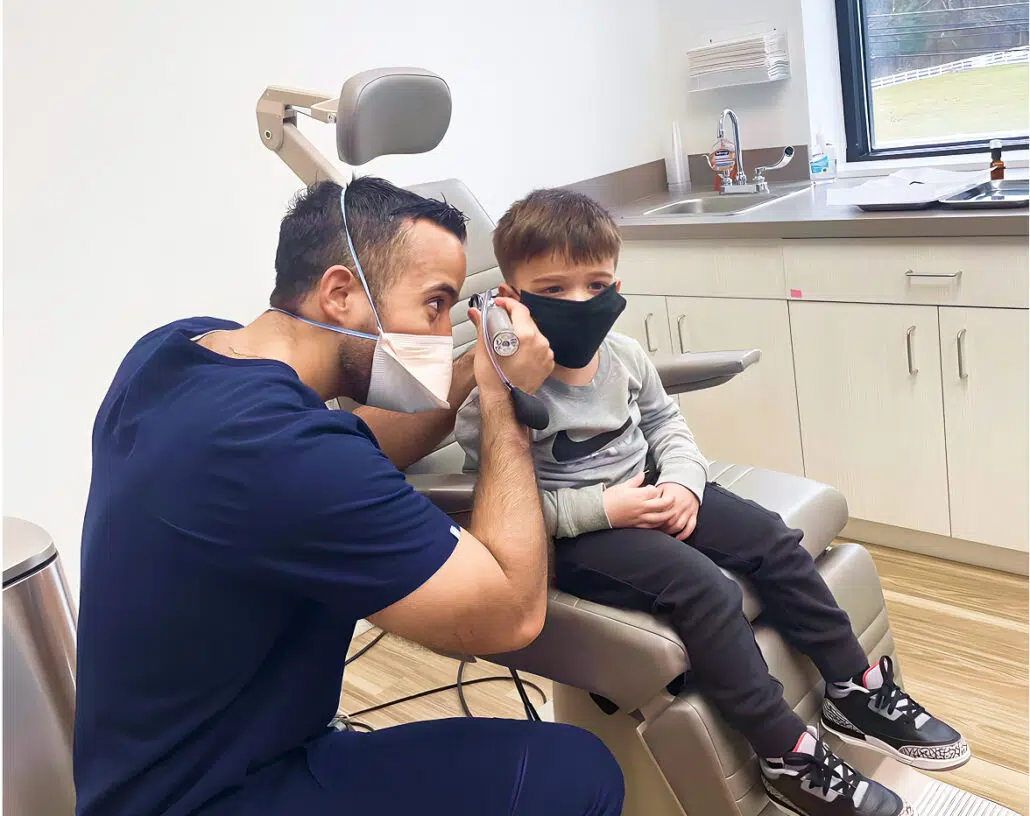
ENT Philadelphia Specialists – Becker ENT & Allergy
Best ENT & Allergy Treatments in Philadelphia.
At Becker ENT & Allergy, our ENT Philadelphia specialists provide advanced care for adults and children with sinus, hearing, sleep, voice, and thyroid conditions. We combine proven treatments with a patient-first approach that focuses on clear communication, same-week appointments, and care that helps you breathe, hear, and sleep better.
ENT Conditions We Treat at our Philadelphia, PA Office
Many people live with ear, nose, and throat (ENT) conditions that affect their daily comfort , Whether you’re dealing with issues related to your hearing, voice, or throat, these conditions can cause significant discomfort and interfere with your well-being.
As Philadelphia’s trusted ENT specialists, we diagnose and treat the full range of ear, nose, and throat disorders — including chronic sinusitis, hearing loss, sleep apnea, thyroid disease, and voice problems.
Our multidisciplinary team provides precise, compassionate care tailored to each patient.
Sinus and Nasal Treatments
Chronic sinus problems can cause pressure, headaches, congestion, and trouble breathing. Our Philadelphia Ear Nose and Throat team evaluates the root cause and builds a plan that helps you breathe comfortably again.
Symptoms
How we diagnose?
Treatments we offer

Related Sinus and Nasal ENT Services
In addition to sinusitis treatment, we also manage a variety of related conditions that can affect breathing and comfort:
- Balloon Sinuplasty
- Sinus Headaches
- Sinus Pressure and Pain
- Sinusitis
- Nasal Polyps
- Turbinate Reduction
- Adenoid Hypertrophy (in adults and children)
- Airway Problems (if nasal-related)
- Chronic Cough (related to postnasal drip or sinus inflammation)
Allergy Testing and Support for Sinus Health
Many long-term sinus symptoms are allergy-related. We offer in-office testing and immunotherapy to reduce triggers that can inflame the nose and sinuses. Learn more in our Allergy Testing and Treatment section.
Hearing and Balance Care
Hearing loss affects about 60.7 million Americans, and can develop from age, noise exposure, infections, or injury. Our Philadelphia ENT specialists and licensed audiologists work together to diagnose the cause of hearing and balance problems and find the right solution for every patient.
Whether it’s through advanced hearing aids, in-office ear care, or surgical treatments, our goal is to help you reconnect with the sounds and moments that matter most.

When to See an ENT
- Trouble understanding speech or needing higher volume
- Ringing in the ears (tinnitus)
- Dizziness, imbalance, or ear fullness

Diagnosis & Treatment
- Comprehensive hearing exams and vestibular testing
- In-office ear cleaning and wax removal
- Custom-fitted digital hearing aids
- Medical treatment for ear infections
- Cochlear or bone-anchored implants for advanced hearing loss

Related Hearing and Balance ENT Services
Our team provides specialized treatments and evaluations, including:
- Ear Infections
- Comprehensive Ear Wax Buildup Care
- Hearing Aids

Sleep and Airway Disorders
Sleep-related breathing problems such as snoring and sleep apnea can affect rest and heart health. Our specialists diagnose airway issues and offer treatments that improve breathing and sleep quality.
Treatment Options
Related Sleep and Airway ENT Services
Voice and Swallowing Disorders
Voice or swallowing problems can make speaking and eating uncomfortable. Our ENT doctors and speech pathologists help restore function and comfort through targeted therapy and minimally invasive treatments.
Treatments We Offer
Related Voice and Swallowing ENT Services

Head, Neck & Thyroid Conditions
The head and neck house vital structures that affect breathing, swallowing, and hormone balance. Our Philadelphia specialists treat thyroid, neck, and reflux conditions using advanced diagnostic and surgical techniques.
As part of the Penn Medicine network, we coordinate care for complex thyroid and neck cases.
When to See an ENT
Treatments We Offer
Related Head, Neck & Thyroid ENT Services

Pediatric ENT
Children often face recurring ear infections, tonsil issues, or sleep-related breathing problems. Our pediatric ENT specialists provide gentle, age-specific care to keep kids healthy and comfortable.
When to See a Pediatric ENT
Treatments We Offer
Related Pediatric ENT Services
Allergy Testing and Treatment in Philadelphia
Allergies can make you feel congested, tired, or foggy. At Becker ENT & Allergy, our Philadelphia allergy team works closely with your ENT specialist to find the source of your symptoms and create a plan that helps you feel better long term.

What We Test For

How We Test
Conditions We Diagnose:
If you often feel congested or have sinus pressure, take a look at our Sinus and Nasal Treatments section.

Allergy Immunotherapy (Shots and Drops)
For patients who want long-term relief, we offer two forms of immunotherapy that train your immune system to react less to allergens.
Options
- Allergy shots (SCIT): weekly injections that slowly build tolerance
- Sublingual drops (SLIT): taken at home under your tongue for certain allergens
Benefits
Treatment Plan
Most patients visit weekly at first, then move to monthly maintenance for about 3 to 5 years.

Environmental and Food Allergy Management
We help patients make small lifestyle changes that bring big relief.
Your plan will focus on simple steps to reduce exposure and prevent reactions.
Environmental Allergies
Food and Medication Allergies
For patients whose sinus pressure or breathing problems return often, our allergy and ENT teams work together to manage both the cause and the symptoms.

Why Choose Becker ENT & Allergy in Philadelphia?
At Becker ENT & Allergy, we combine trusted medical expertise with care that feels personal. Here’s why patients across Philadelphia choose us:

Meet Our ENT and Allergy Providers
Dedicated to using their skills & experience to help patients to diagnose, treat & manage their ENT-related medical problems.
About Us
Becker Ear, Nose, and Throat: Philadelphia’s Most Trusted Source for Ear, Nose, and Throat (ENT) Care.
At Penn Medicine Becker ENT and Allergy, our board-certified physicians, allergists, and audiologists are leading experts in their fields. They are well-respected in the academic community, having authored over 100 scientific publications and textbooks, and serving as editors and reviewers for over 20 journals. Their expertise is recognized globally, with their works translated into multiple languages.
In addition to being featured in U.S. News and World Report, Philadelphia Magazine, and Kev’s Best, our specialists are pioneers in treating complex conditions like chronic sinusitis, sleep apnea, and thyroid cancer using the latest minimally invasive techniques. Our team collaborates with allergists, audiologists, and other specialists to provide comprehensive, patient-centered care that addresses each individual’s unique needs.






Find Our Philadelphia ENT Clinics

Address
1740 South Street, Suite 401
Philadelphia, PA 19146
Phone
215-671-6330
Fax: 215-671-6331
Opening Hours
Monday – Friday
8:00 AM – 5:00 PM
Saturday – Sunday
Closed
For holiday schedule hours contact our office*
ENT Care for Patients Across the Philadelphia Region
Get directions to our location on Google Maps
Parking garage: Convenient parking is provided at the parking garage at 1700 South Street. Visitors and patients of Penn Medicine Rittenhouse receive discounted rates with parking validation.
Valet parking: Valet parking is temporarily suspended at all Penn Medicine locations due to Covid-19.
Questions Our Patients Ask
Chronic sinusitis often comes from ongoing inflammation due to allergies, nasal polyps, or blocked drainage. See an ENT if symptoms last 12 weeks or more, infections keep coming back, or medicines are not helping.
Yes. Options may include oral appliance therapy, nasal or throat procedures to open the airway, and Inspire implant therapy for eligible patients. An ENT sleep evaluation will help choose the right path.
Yes. We diagnose and treat ear infections in children and offer follow-up hearing checks. When infections are frequent or fluid lingers, we discuss options like ear tubes.
Many plans do not require one, but some HMOs do. We can check your benefits when you book so you know exactly what is needed.
We provide skin prick and intradermal testing for common allergens. Blood testing is available when skin testing is not a good fit. Most patients get same-day skin test results.
ENT doctors treat conditions of the ears, nose, sinuses, throat, voice, sleep airway, and head and neck. That includes sinusitis, hearing loss, ear infections, sleep apnea, voice and swallowing problems, thyroid and neck issues, and pediatric ENT concerns.
Same-week appointments are often available at our South Street and Walnut Street offices. Call or book online to see current openings.
We do not publish rankings. The best fit depends on your condition. Review our team page to choose by subspecialty such as sinus, hearing, sleep, voice, thyroid, or pediatric ENT.
Yes. We are located in 1740 South Street, Suite 401, Philadelphia, PA 19146.

